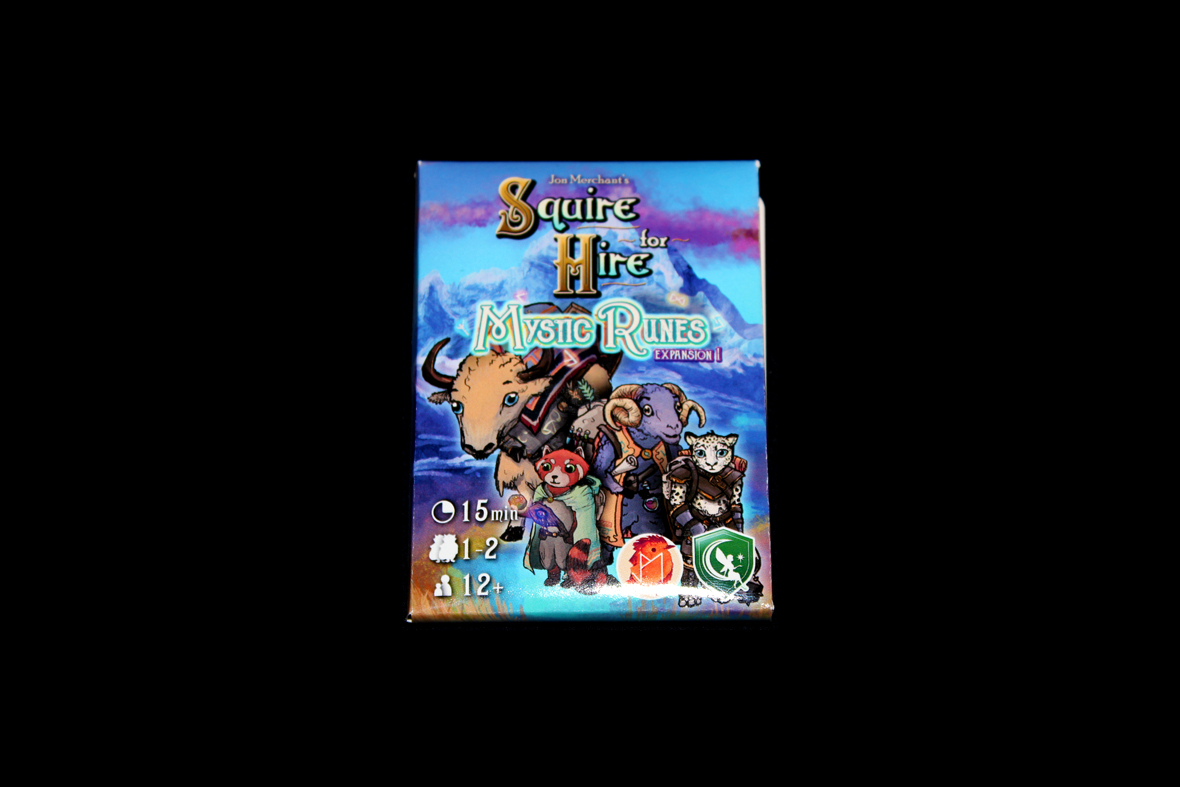
Base price: ~$9.
1 – 2 players. (Combine with the original for 1 – 4!)
Play time: 15 – 25 minutes.
BGG | Board Game Atlas
Check it out on Kickstarter!
Logged plays: 5
Full disclosure: A preview copy of Squire For Hire: Mystic Runes was provided by Letiman Games. Some art, gameplay, or other aspects of the game may change between this preview and the fulfillment of the Kickstarter, should it fund, as this is a preview of a currently unreleased game. Also, while I don’t charge for Kickstarter previews, the publisher was charged a rush fee due to the tight timeline they needed the review completed in.
Alright, still slow moving but I actually wrote some reviews this week, which is incredible! I’m starting to get above water on this whole “indefinite period of time stuck at home” thing. So maybe I can pick it back up. The problem is I’m not getting games played, which is making the reviewing tough. We’ll see if the photos get done in time. Hope so! Either way, we’ve got a sequel game this week; another round of the Squire for Hire series from Letiman Games! Let’s see what Squire for Hire: Mystic Runes adds to the mix.
In Squire for Hire: Mystic Runes, you’re still playing as lowly squires trying to keep inventory for knights. But now, you’ve discovered magic runes that further augment your abilities. Why the knights didn’t keep them is unclear, but hey, free magic never hurt anyone (Editor’s Note: Canonically throughout literature, it’s hurt an uncountable number of people). Hit the inventory management puzzle again to see if you can prove your worth. Will you manage to be able to hold down a decently lucrative job? In this economy?
Contents
Setup
It essentially mimics the original Squire for Hire. Take the Squire Cards, and give each player 1:
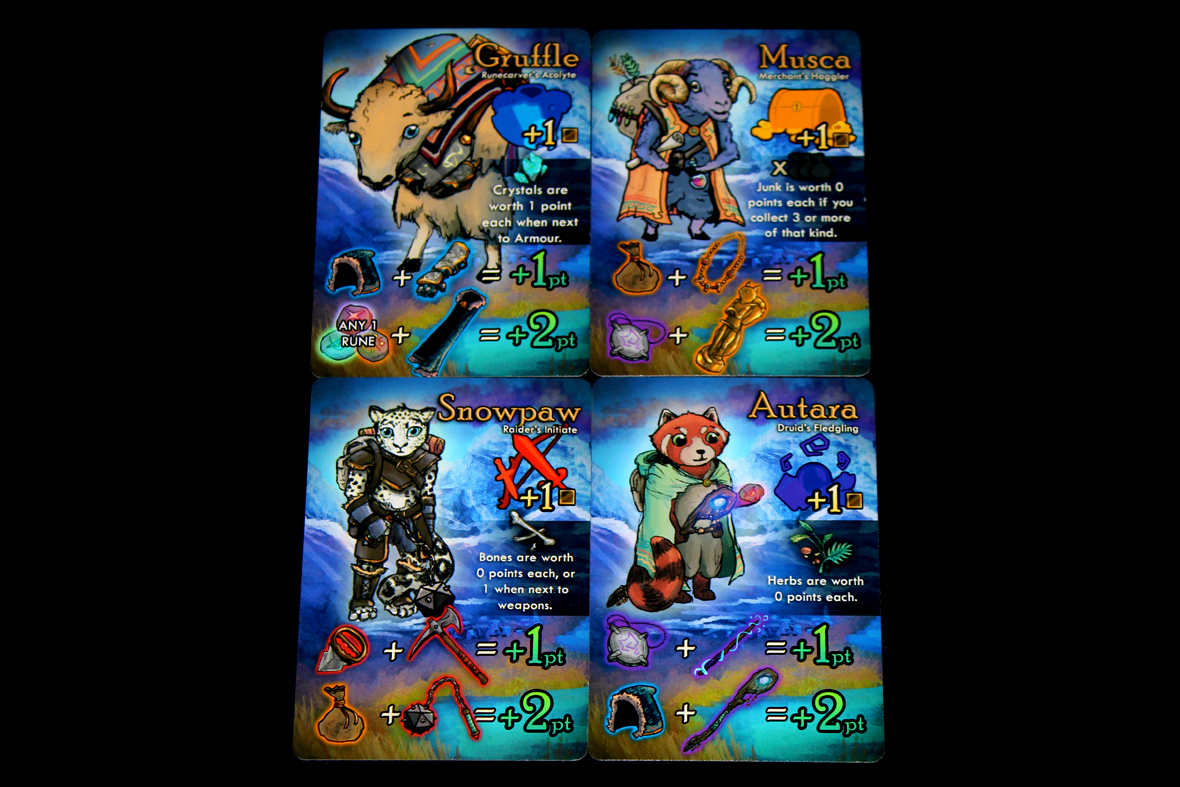
Next, shuffle the Loot Cards and deal each player 2:
They should keep one Loot-side up and return the other to the pile. Shuffle it and turn it Story Card side face-up:
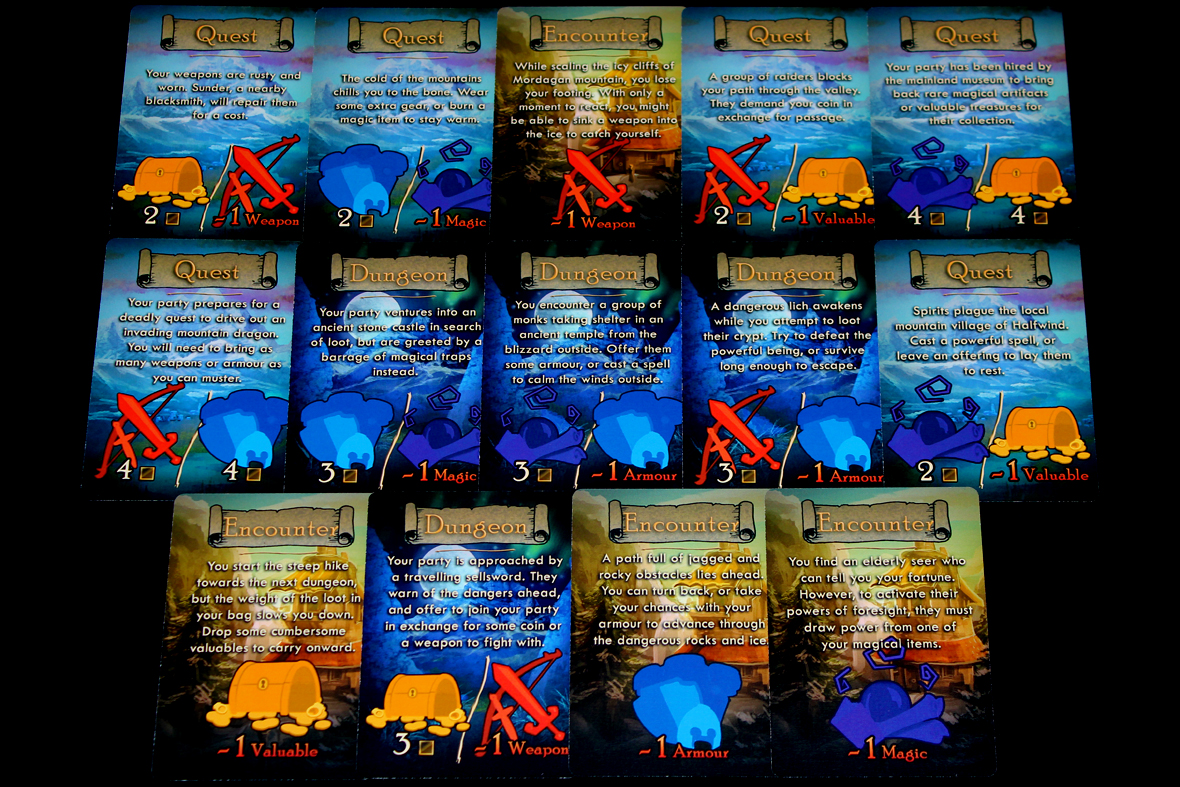
Flip the top two cards over and put one on either side of the deck (left and right) so that there’s a Loot Card, a stack of Story Cards, and then another Loot Card. You should be ready to start!
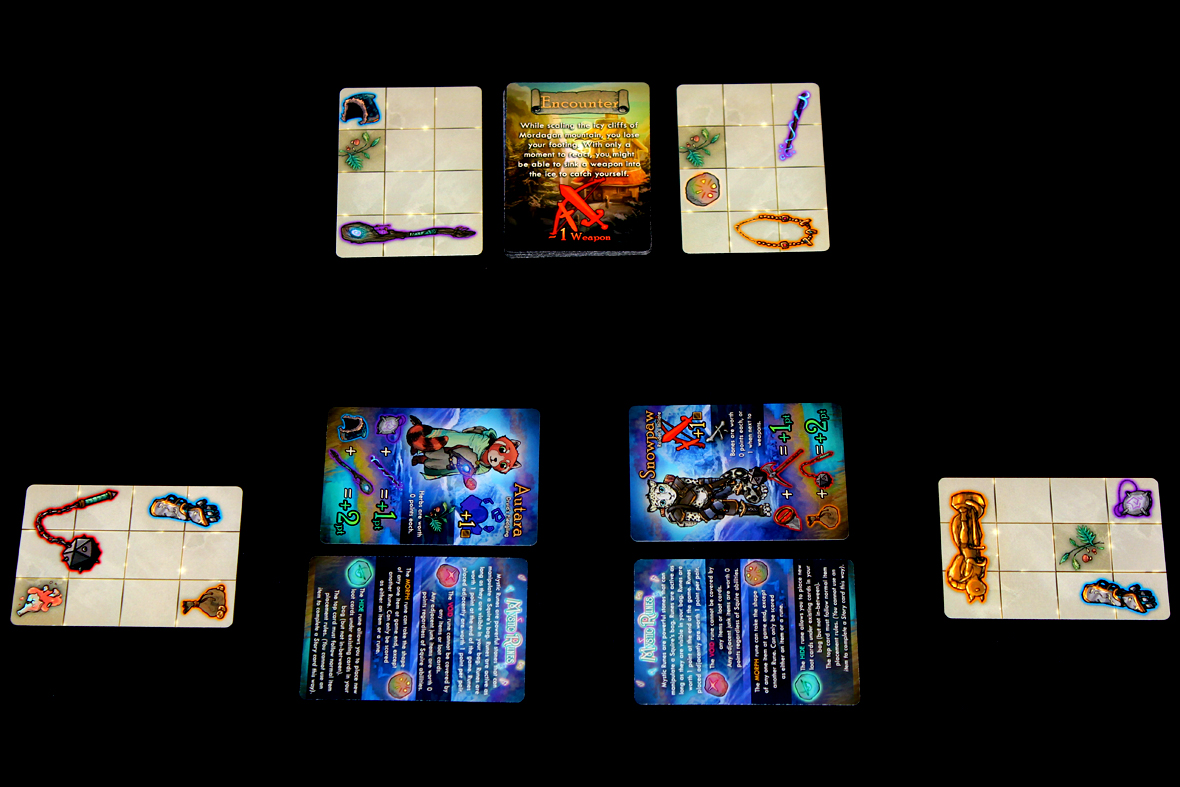
Gameplay
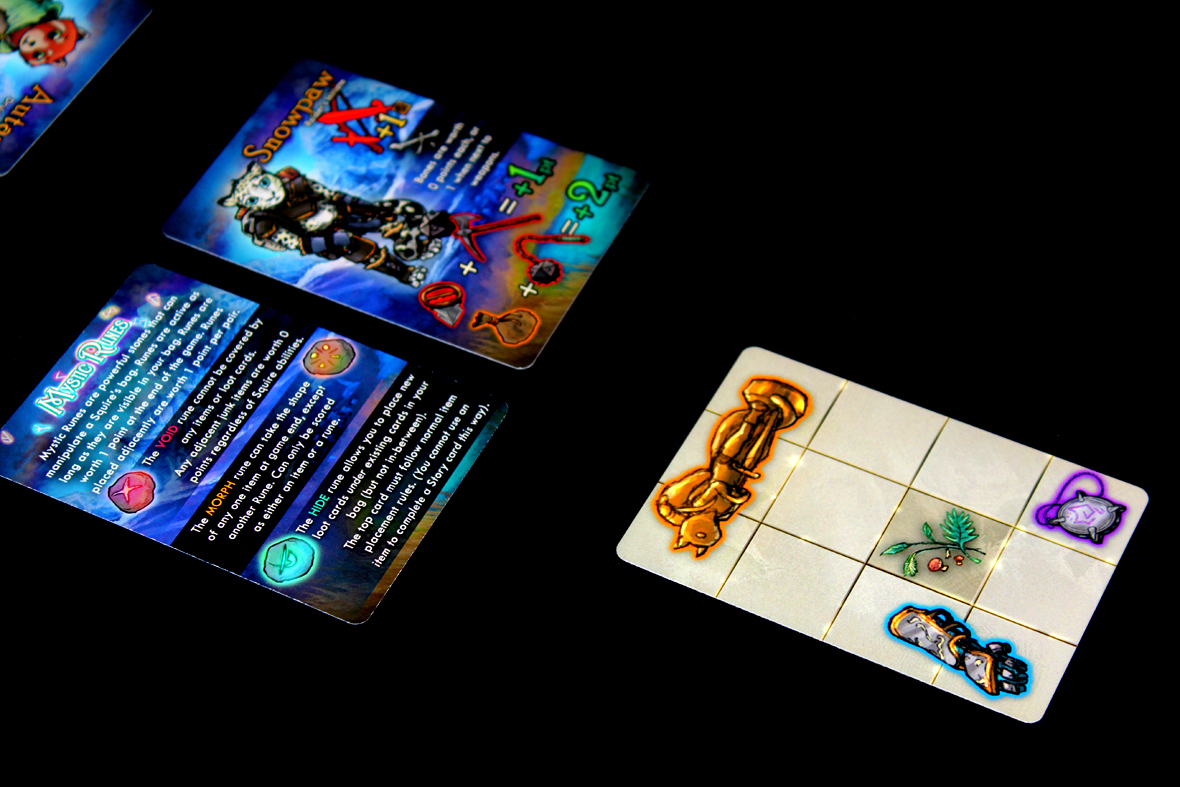
The game plays about the same as the first one. In it, you play as squires eager to please the knights they attend by carrying all of their loot from various quests and dungeons and such. Your goal is to organize your bag better than all the other squires so that you may be named Squire of the Month or something more temporally appropriate. But how do you do that?
On your turn, you’ll look at the current Encounter Card. It will present you with one of two options. Generally, one is for having a certain amount of some type of item. The other is if you’re willing to sacrifice a smaller amount of another type of item. How much you have of that type is determined by looking at your bag and seeing how many squares of area the items of that color takes up.
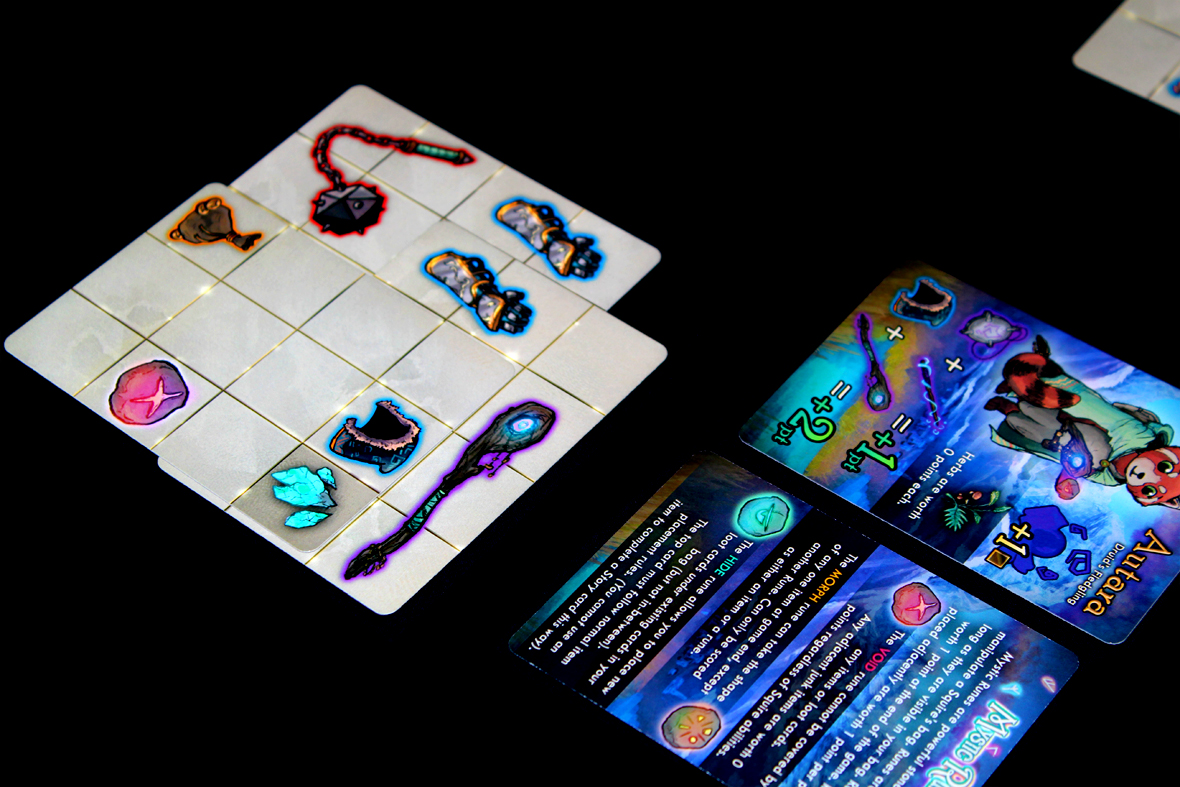
If you qualify (either by having enough of one item or by giving up the other item indicated), you may take one of the Loot Cards on either side of the Encounter Card and add it on top of existing cards in your play area. When you do, flip the Encounter Card and place it on either side of the deck. If there are no cards on one side, place the Encounter Card (now a Loot Card) there.
Certain cards will give you Runes, which have three different effects:
- Void Rune (Red): Junk cards placed next to this rune are worth 0 points.
- Morph Rune (Yellow): This Rune becomes any one item (or stays a Morph Rune) at the end of the game.
- Hide Rune (Teal): This Rune allows you to tuck cards underneath when you obtain them, rather than placing them on top of cards.
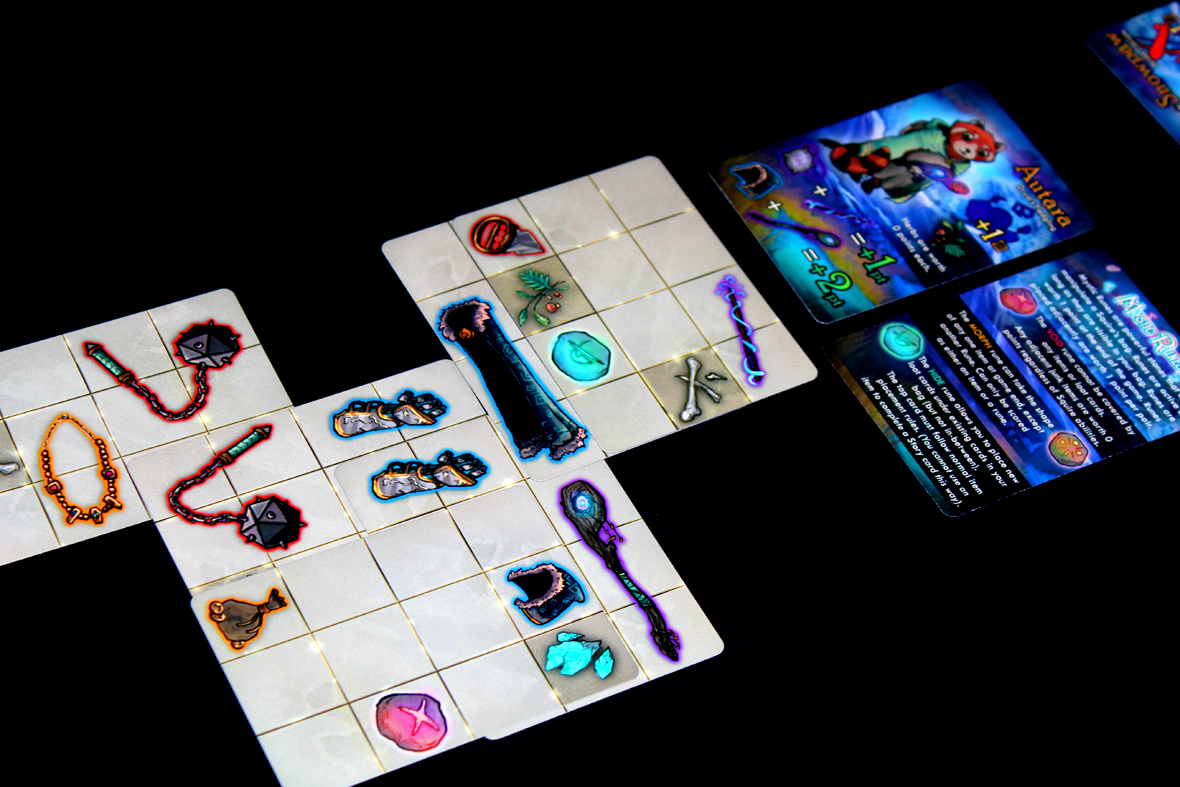
Play continues until the deck runs out, at which point you shuffle the deck, reveal two new Loot Cards, and go again. After the deck runs out again, the game ends! Then you score:
Like the base game, you get 1 point for every item (colorful outline) you have, and -1 point for every Junk item you have (gray outline). Each character has their own special rules for Junk and special bonus rules for items, but you also get a bonus +1 point for every pair of the same items you have adjacent to each other (orthogonally, not diagonally). Unlike the base game, however, you score an additional +1 point for every Rune in your inventory, as well.

The player with the most points wins!
For the Solo game, play normally, but don’t reshuffle the deck when it runs out the first time. If you beat 25 points, you win!
Player Count Differences
Essentially none. The solo game is the same as the two-player game, you just don’t have … another player. And you need to try and beat 25 points in order to win the solo game! But yeah, beyond that, I find the solo mode a bit easy, but I don’t think it’s a bad game if you’re looking to burn a bit between other games. I haven’t tried the expanded four-player game.
Strategy
- I would say go for the rune that allows you to tuck cards first, if you can. The Hide Rune is going to be pretty useful for avoiding taking a bunch of junk that you don’t want to take. It’ll also let you set up your various items so that you can really capitalize on the identical matching and matching bonuses you’ll potentially get from your Squire.
- When taking your initial pick, I usually recommend going wide rather than deep. Having a variety of options will really help you with the initial cards, since they tend to be “have a lot of something” or “be willing to sacrifice a small thing”. If you go deep (taking fewer large items), you’re operating at some risk; if you get what you need, you’re golden; if you miss it, then your opponent is going to likely get ahead of you without much you can do.
- Look at what your opponent needs / wants and cover those cards, if you can. There are cards that your opponent strictly benefits from (usually a +2 point bonus if they can get them). Cover them as often as you can; you strictly do not want to make it easier for them to score lots of free points. Or, better yet, if you can take the card they need, then there’s no chance for them to get it. Every +2 bonus has one item that only occurs on two cards; that’s the one you want to pounce on, if you can.
- Don’t take too much junk. There’s one player who benefits from it, but, frankly, if I see that player hoarding junk, I’m much more likely to stomp on them by taking the junk they would need to complete their set. It’s almost hate-drafting, but, it’s also pretty explicitly that.
- Void Runes are generally useful. They just negate the junk penalty, which is fine, honestly. If you can get them early you can try to place extra junk next to them; getting them late just means you need to place them next to large sectors of junk, if you can.
- Morph Runes are a good way to compensate for your opponent hate-drafting. If you can use a Morph Rune, you can still get that +2 bonus, which is nice (in addition to the +1 point bonus for just having a rune or item, generally). I’d say this is what I would focus on getting after the Hide Rune. Void Runes are nice-to-haves but aren’t as useful as these, in my opinion.
- Passing is generally not great, unless it’s for a Dungeon that your opponent can’t complete. In that case, the card gets burnt, but then it’s your turn (since a Dungeon eats up their turn as well). It’s sort of a neutral action. You’d rather have a situation in which you get a card and your opponent doesn’t, but this is a decent compromise.
Pros, Mehs, and Cons
Pros
- I do like the color scheme of this game. It’s very bright and pleasant, and even the glow on the items themselves is nice. I think the cover art is my current favorite bit; the blend of blues and purples and teals works really nicely for a more magically-themed game.
- The art is pleasant, as well. I like animal-themed games a lot. I think Everdell is currently the gold standard here (tied with Dale of Merchants, which is its own very good and very unique style).
- Very portable. It’s a wallet game. You’ve heard me gush over Button Shy; it’s the same amount of cards.
- Plays quickly. For a spatial game, especially. You can kind of just bust through it in under half an hour; even faster once you get used to the cards and the progression of it.
- The spatial aspect of the game remains very satisfying. I’m just generally pro-spatial games. I like having to move the cards around and I like balancing whether cards go above or below other cards quite a bit. It’s the most fun you’ll have with inventory management.
- I like the quick little story blurbs as you progress through the game. I liked that about the base game as well, to be fair.
- The runes have interesting abilities. I was a bit skeptical, but they do change up the game a bit. I wouldn’t say they’re massive shifts, but, I think they’re a nice lateral move.
Mehs
- After several games, I really haven’t gotten Musca’s anti-junk ability to work for me. It’s a bit easy to get blocked and stuck with a ton of junk unless you group it together so that it’s easy to cover it up. I’d say your mileage may vary a lot with this particular animal.
Cons
- The “rich get richer” aspect of the game is vaguely frustrating if you get unlucky. It’s not as bad given how short the game is, but I think the Squire for Hire series in general kind of relies on that aspect. You need a certain amount of squares covered in order to avoid having to cover things, and once you get that you’ll essentially qualify for everything. If you don’t have that much stuff, then you’re going to have to hope you get lucky and you can get rewarded for what you have. It can often split either way.
- Printing the only relevant information about the runes on the back of the Character Cards with no indication in the rulebook was a frustrating choice. I played a few games of Mystic Runes with no idea what the runes did; I thought they were just an underwhelming additional item. I accidentally flipped one of the Character Cards over and found the explanations for the runes, which, isn’t great. There needs to be something in the rulebook indicating that that’s the case, and it needs to be pretty explicit, given that it’s very pertinent information that will likely get ignored by experienced players. I didn’t see it specifically called out in the rulebook, so I didn’t look past that.
Overall: 7.5 / 10

Overall, I thought Squire for Hire: Mystic Runes was pretty good! I think it’s got a few things over the base game, which is nice, but it almost has to, right? A purely lateral move would probably have earned it a lower score from me, since … I feel like there’s some need for expansions / expandalones to justify their own existence, if that’s a fair thing to say. I think I was a bit frustrated by my confusion about the runes; since I had played the previous iteration I never thought to check the back of the Character Cards for a guide on what they did. Just saw that they were worth +1 point at the end of the game and figured it was a new type of resource for Encounters. But that happens, sometimes. What I would really like to see is something that rewards players who don’t have quite as many things in their bag as their opponents, or some sort of catch-up mechanism. As it stands, the game seems to continually reward players who are already fairly flush with resources, and by doing so makes it harder for a player who missed out on a critical card to come back. It’s a short enough game that I’d thought it wouldn’t matter, but it can still feel a bit frustrating to watch the game get away from you like that. I’ll be interested to see how they push the series further with subsequent iterations. In the meantime, though, it’s a cute animal game, which I like, very portable, also like, and it’s still doing a great job with distilling the inventory management puzzle down into a salient wallet game. And I think that’s good! I really like that more things are happening in the wallet game space. And if you’re a fan of those things or you’re looking for a quick two-player card game, you might enjoy Squire for Hire: Mystic Runes as well!